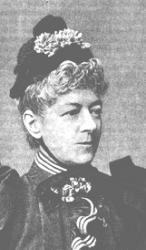
1841 - 1926 Author of "For all Thy care we bless Thee" in A Hymnal for Joyous Youth Doudney, Sarah, daughter of Mr. George E. Doudney, of Cosham, Hants, was born near Portsmouth, but removed into a remote village in Hampshire at an early age. Her first efforts in literature were made when she was quite young, her poem, "The Lessons of the Water-Mill," a popular song, especially in America, having been written when she was only fifteen. Known mainly to the reading public through her stories, A Woman's Glory, Stepping Stones, and others, and through her contributions to the Sunday Magazine, Good Words, and other serials, her works, including fiction, and sacred and secular poems, have been widely read and appreciated. Her sacred poems are the least numerous of her writings. Some of these, as, "The Master hath come, and He calls us to follow," and "Saviour, now the day is ending," for use at the close of Evening Service, and of more than usual merit, create the desire for more of a like kind. Greater use, however, may be made of what she has written than has been done. By being buried in magazine literature, her hymns are somewhat difficult to trace. Her Psalms of Life was published by Houlston in 1871.
In the Sunday School Union Songs of Gladness, 1871, the following were given;—
1. He hath gone into His garden. The Vineyard of the Lord.
2. In Thy holy garden ground. The Vineyard of the Lord.
3. Land of peace, and love, and brightness. Heaven.
4. Saviour, now the day is ending. Sunday Evening.
5. The Master hath come, and He calls us to follow. Jesus and Mary of Bethany.
6. We praise our Lord to-day. Sunday.
7. We sing a loving Jesus. Praise of Jesus.
Of these, Nos. 1, 2, 3, are in her Psalms of Life, 1871, and all have passed from the Songs of Gladness into other collections.
Her:—
8. Room for the wanderer, room. Christ's Invitation. is in W. B. Stevenson's School Hymnal, 1880.
-- John Julian, Dictionary of Hymnology (1907)
==================
Doudney, Sarah, p. 307, i. Other hymns in common use:—
1. For all Thy care we bless Thee. Morning.
2. Lord of the golden harvest. Harvest.
3. Now the solemn shadows darken. Evening.
Nos. 1, 2, are from Miss Doudney's Psalms of Life, 1871, and No. 3 is in Mrs. Brock's Children's Hymn Book, 1881.
--John Julian, Dictionary of Hymnology, Appendix, Part II (1907)
Sarah Doudney


 My Starred Hymns
My Starred Hymns




